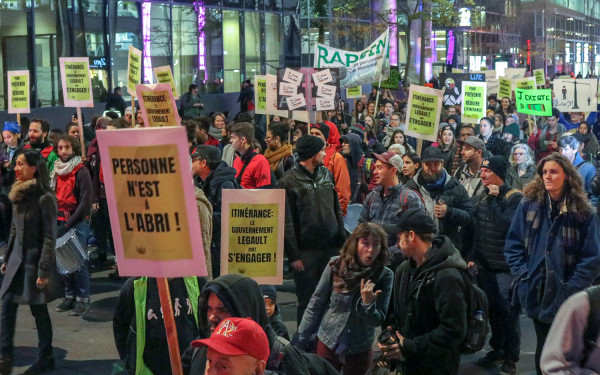Editorial: Legault’s curfew further marginalizes our most vulnerable neighbours
On Saturday night, Raphael Andre, an unhoused Innu man, froze to death in a porta-potty.
He was just metres away from The Open Door, a shelter outfitted with beds and plexiglass that could not open overnight due to public health regulations, staff told CTV. Meanwhile, a province-wide curfew barred him from being seen outdoors—an ostensible safety measure, one Premier François Legault insisted apply even to those facing homelessness. This despite a patchwork system that is painfully inadequate for their needs.
The Legault government’s overall response to the pandemic has been a disaster. Many people, while unhappy with continued isolation and a lack of social life, may feel good about the lockdown and nighttime curfew in place. It feels like something more substantial is happening to slow the tide of COVID-19. It might feel like the firm hand of the state is finally getting something done. Unfortunately, the CAQ has done what it seems to do with every situation requiring tact and foresight—it throws much of the population to the wind, including unhoused people, sex workers, and BIPOC communities.
Already, unhoused people have been ticketed for being on the streets and disenfranchised groups are facing the brunt of the security apparatus. This absurd cruelty of penalizing people who have nowhere else to go is hard to comprehend.
While the Quebec government has argued that shelters have room, that there's no valid reason to defy curfew, evidence points to the contrary. This fundamental contradiction between official policy and reality—requiring people without homes to stay inside, while also limiting their access to even temporary shelter—may feel like an unfortunate oversight in the system. You may ask yourself, "Well where does the government expect them to go?"
Make no mistake: the government expects them to die. That’s its unspoken policy—to drive them out of homes, out of encampments, and off the streets, until our unhoused neighbours have literally no place to stand.
Furthermore, the curfew further criminalizes sex workers who have already been left out of any governmental support during the pandemic. For those working under the table, like undocumented immigrants, the curfew gives police even more excuses to deliver harm and abuse.
So what is to be done? We do not want to be another voice pointing to the problems without a solution. The solutions have been before us all along. All year, an explosion of mutual aid groups have filled the glaring holes in the social safety net. This is a time for material solidarity. This does not mean posting on social media; this means physically helping your neighbours, unhoused and housed alike. It means pooling our resources and skills to provide for each other's physical needs. It means demanding municipal, provincial, and federal funds go towards our own community projects, not towards the police or shadowy, top-down nonprofits.
Our governments operate on the assumption that a given issue can be policed out of existence. The reality is that public health crises need community solutions, supported by our society's vast financial resources, that actually focus on people's needs. People need to be able to stay home and avoid social contact. This would require financial support to stay home from work, free food delivery, guaranteed housing, and rent relief.
Marginalized communities know what they need. Community solutions have already formed. We need democratic programs that provide for our needs without harming the most vulnerable members of our society. This isn't just about this pandemic—it's about building structures that allow us to weather all kinds of disasters, including the ongoing disasters of homelessness and inequity in Quebec.
Correction: A previous version of this article said that Raphael Andre died on Sunday night. In fact, his body was discovered Sunday morning; he died overnight on Saturday. The Link regrets this error.

.png)


_600_375_90_s_c1.jpg)
_600_375_s_c1.png)
